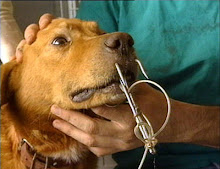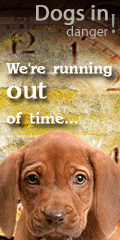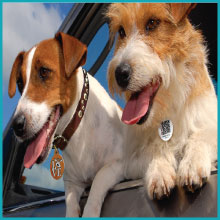Bark Busters Offers 'Dogs and Poisons Safety Tips' for National Animal Poison Prevention Week
Put safety first by knowing what poisons lurk in your home and yard Since dogs, especially young dogs, are naturally curious creatures, it is important that we know and remain vigilant about potential poisons that our snooping pooches may find and ingest
Just because something is safe for people to ingest, doesn't necessarily mean it is safe for our canine companions to also eat. By following these tips, you can take the steps to protect your dog from these dangers.
Englewood, Colo. (PRWEB) March 2, 2009 -- In honor of National Animal Poison Prevention Week March 16, Bark Busters, the world's largest dog training company, wants to help dog owners take special precautions to protect their canine companions from surprisingly common toxins. Not only is it important to take preventative measures with toxic materials found both inside and outside the home, but it is also vital to be able to recognize the signs indicating a dog has ingested something poisonous and know what actions to take.
"Since dogs, especially young dogs, are naturally curious creatures, it is important that we know and remain vigilant about potential poisons that our snooping pooches may find and ingest," said Liam Crowe, CEO and master dog behavioral therapist of Bark Busters USA. "Just because something is safe for people to ingest, doesn't necessarily mean it is safe for our canine companions to also eat. By following these tips, you can take the steps to protect your dog from these dangers."
Dogs and Poisons Safety Tips:
Toxic foods include chocolate, avocado, onions and garlic, raisins and grapes, alcoholic drinks, caffeinated beverages, macadamia nuts, and chewing gum with xylitol.
Many plants (even dead or dried) are toxic to pets. In some cases, only certain parts of the plant are dangerous (leaves, fruit, seeds). Be aware of the toxic plants that grow in your home and surroundings (both cultivated and wild), and keep your pets away from them or remove them entirely.
Other toxins found outside include mushrooms and garden mulch.
Keep your pets off lawns or gardens that have been treated with fertilizers, herbicides or insecticides. If your dog has come in contact with treated lawns or has walked on snow or ice treated with ice-melt, wipe his feet clean as soon as you get home to avoid the possibility of him licking his paws and ingesting the poison. Store all chemicals in cabinets and other places your pet can't reach.
Real danger to pets continues from antifreeze/coolant, even though animal-friendly products are now available (usually made with propylene glycol, not ethylene glycol). Always wipe up antifreeze leaks or spills of any size. Attracted to the sweet taste, pets can die from kidney failure if they ingest even a small amount of this very toxic material.
Store poisonous baits to rid your home of pests (rodents, snails, insects, etc.) in places that your pooch cannot access. Like antifreeze, some baits smell sweet but are very toxic to pets, causing severe internal bleeding.
Other household items poisonous to pets include household cleaners (the fumes can be noxious) and heavy metals such as lead, found in paint chips and linoleum.
Consult with your veterinarian before giving your dog any vitamin, herbal supplement or medication made for humans. Even small doses of medications of any kind--whether for humans or pets--can be lethal to pets. Keep all medicines well out of your dog's reach.
Symptoms of poisoning (toxicity) in your pet can include:
Vomiting/upset stomach
Labored OR shallow breathing
Drooling
Increased OR decreased heart rate
Fever
Hyperactivity OR sluggishness/lethargy
Increased thirst OR lack of thirst or hunger
Dilated pupils
Stumbling or staggering
Seizures or tremors
Loss of consciousness
If you think your dog has ingested a dangerous substance, contact your veterinarian or local animal hospital immediately. If you are advised to bring the dog into the clinic, be sure to take along the packaging of the item or a sample of the plant you think your dog may have eaten. This will help the veterinarian to know how best to treat your pet.
Also consult with your veterinarian for a detailed list of all potentially poisonous items and substances found around your home.
About Bark Busters
Bark Busters, the world's largest, most trusted dog training company, started in Australia in 1989 and came to the United States in 2000. Since inception, over 500,000 dogs have been trained worldwide using its dog-friendly, natural methods. With 240+ franchised offices in 41 states and more than 400 offices in 10 countries, Bark Busters is continuing its mission to build a global network of dog behavioral therapists to enhance responsible dog ownership and reduce the possibility of maltreatment, abandonment and euthanasia of companion dogs. Bark Busters is the only international dog training company that offers Guaranteed Lifetime Support. Therapists will provide future sessions free of charge if problem behaviors recur, or if any new problems develop. For more information, call 1-877-500-BARK (2275) or visit BarkBusters.com, where dog owners can complete a Dog Behavioral Quiz to rate their dogs' behavior.
Monday, March 2, 2009
Subscribe to:
Post Comments (Atom)

















1 comment:
Wow! Thanks for that info. I can't tell you how many times I have wondered if my dog is going to be ok after eating something off the floor. I also wanted to share this web site with you that I found. Any time I need to find anything for my dog I go to this site www.animallookup.com I have located my breeder, groomer and my local pet supply place from this site. It is great for just browsing too. Thanks again for the tips.
J
Post a Comment